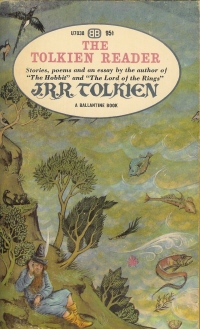 Cover of the first edition | |
| Author | J. R. R. Tolkien |
|---|---|
| Illustrator | Pauline Baynes[1] |
| Language | English |
| Genre | Fantasy short stories, play, essay, poetry |
| Publisher | Ballantine Books |
Publication date | September 1966[2] |
| Publication place | United States |
| Media type | Print (Paperback) |
| Pages | xvi, 24, 112, 79, 64 pp (contents separately paginated) |
| ISBN | 0-345-34506-1 (reprint) |
| OCLC | 49979134 |
| Preceded by | Tree and Leaf |
| Followed by | The Road Goes Ever On |
The Tolkien Reader is an anthology of works by J. R. R. Tolkien. It includes a variety of short stories, poems, a play and some non-fiction. It compiles material previously published as three separate shorter books (Tree and Leaf, Farmer Giles of Ham, and The Adventures of Tom Bombadil), together with one additional piece and introductory material. It was published in 1966 by Ballantine Books in the USA.[3]
Most of these works appeared in journals, magazines, or books years before the publication of The Tolkien Reader. The earliest published pieces are the poems "The Man in the Moon Stayed Up Too Late" and "The Hoard", both of which were first published in 1923.[4] They were reprinted together with a variety of other poems in the book The Adventures of Tom Bombadil in 1962, and the entire book was included in The Tolkien Reader in 1966.[5] The section titled Tree and Leaf is also a reprint. It was published as a book bearing the same name in 1964, and consists of material initially published in the 1940s.[6] The book Farmer Giles of Ham was published in 1949, and unlike The Adventures of Tom Bombadil and Tree and Leaf, it did not merge previously published material, although unpublished versions of the story had existed since the 1920s.[7] "The Homecoming of Beorhtnoth Beorhthelm's Son" was first printed in an academic journal in 1953.[8]
The "Publisher's Note" and "Tolkien's Magic Ring" are the only works in the book which Tolkien did not write. They are also the only parts of the book which were written in the same year that The Tolkien Reader was published.[5]
- ^ Drout, Michael D.C. (2007). The J. R. R. Tolkien Encyclopedia. Taylor & Francis. ISBN 978-0-415-96942-0.
- ^ Christina Scull & Wayne G. Hammond (2006a), The J. R. R. Tolkien Companion and Guide: Volume I: Chronology, HarperCollins, p. 673; ISBN 978-0-618-39113-4
- ^ "Books by J.R.R. Tolkien". The Tolkien Society. 27 October 2016. Retrieved 17 November 2020.
- ^ Drout 2007, p. 2.
- ^ a b Tolkien 1966, p. iv.
- ^ Cite error: The named reference
:1was invoked but never defined (see the help page). - ^ Drout 2007, p. 197.
- ^ Kocher, Paul H. (1972). Master of Middle-earth: The Achievements of J.R.R. Tolkien. Thames and Hudson. p. 186. ISBN 0-500-01095-1.